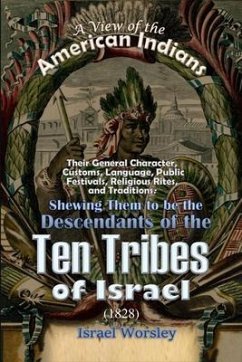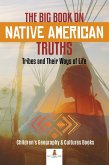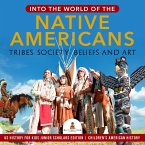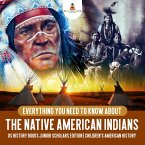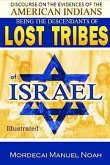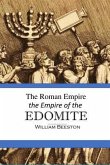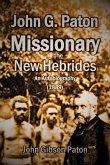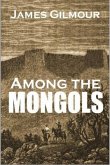"Are the Ten Tribes of Israel lost or missing?... Jews may have found their way to America." - The Eclectic Review (1829)
"Israel Worsley worked over the material gathered by Boudinot and Smith, and added something." -Narrative and Critical History of America (1889)
"Established some very curious coincidences between the Beni-Israel, and some of the American tribes." -The Congregational Magazine, 1828
Are the Lost Ten Tribes of Israel to be found in Native American tribes of North and South America?
In 1828, Unitarian minister Israel Worsley sought to answer this question in the affirmative by publishing the book:
"A View of the American Indians...Shewing Them to be the Descendants of the Ten Tribes of Israel."
The purpose of Worsley's 1828 book was to give a concise but conspicuous view of the Lost Ten Tribes of Israel, extracting from the works of Ethan Smith, Elias Boudinot, and other sources including incidental remarks of historians, Josephus, Prideaux, Gibbon, Robertson and others, such materials as bear directly upon the point in question.
Among the proofs cited by Worsley in support of Native Americans being descendants of the lost tribes of Israel are the following:
. The American Indians live in tribes;
. They have a tradition prevailing universally, that they came into that country at the Northwest corner;
. They acknowledge One God, the Great Spirit, who created all things seen and unseen-the name by which this being is known to them is ale, the old Hebrew name of God; he is also called yehovah, sometimes yah, and also abba;
. They are distinctly heard to sing with their religious dances, halleluyah or praise to yah;
. They keep annual feasts which resemble those of the Mosaic ritual;
. There is a sort of jubilee kept by some of them;
. They have cities of refuge;
. In their temples is a holy place into which none may enter but the priest;
. The priests garb is a humble imitation of the High Priest's robes, with a breast plate and other ornaments;
. They have a succession of priests, who are inducted into office by purification and anointing;
. They had once a holy book, which while they kept, things went well with them; they lost it, and in consequence of the loss fell under the displeasure of the Great Spirit; but they believe they shall one day regain it;
. They are looking for and expecting someone to come and teach them the right way.
In his concluding chapter, Worsley notes that "in the book of Esdras their journey can be traced into a land where no man dwelt."
About the author: Israel Worsley (1768-1836) was an English Unitarian minister.
"Israel Worsley worked over the material gathered by Boudinot and Smith, and added something." -Narrative and Critical History of America (1889)
"Established some very curious coincidences between the Beni-Israel, and some of the American tribes." -The Congregational Magazine, 1828
Are the Lost Ten Tribes of Israel to be found in Native American tribes of North and South America?
In 1828, Unitarian minister Israel Worsley sought to answer this question in the affirmative by publishing the book:
"A View of the American Indians...Shewing Them to be the Descendants of the Ten Tribes of Israel."
The purpose of Worsley's 1828 book was to give a concise but conspicuous view of the Lost Ten Tribes of Israel, extracting from the works of Ethan Smith, Elias Boudinot, and other sources including incidental remarks of historians, Josephus, Prideaux, Gibbon, Robertson and others, such materials as bear directly upon the point in question.
Among the proofs cited by Worsley in support of Native Americans being descendants of the lost tribes of Israel are the following:
. The American Indians live in tribes;
. They have a tradition prevailing universally, that they came into that country at the Northwest corner;
. They acknowledge One God, the Great Spirit, who created all things seen and unseen-the name by which this being is known to them is ale, the old Hebrew name of God; he is also called yehovah, sometimes yah, and also abba;
. They are distinctly heard to sing with their religious dances, halleluyah or praise to yah;
. They keep annual feasts which resemble those of the Mosaic ritual;
. There is a sort of jubilee kept by some of them;
. They have cities of refuge;
. In their temples is a holy place into which none may enter but the priest;
. The priests garb is a humble imitation of the High Priest's robes, with a breast plate and other ornaments;
. They have a succession of priests, who are inducted into office by purification and anointing;
. They had once a holy book, which while they kept, things went well with them; they lost it, and in consequence of the loss fell under the displeasure of the Great Spirit; but they believe they shall one day regain it;
. They are looking for and expecting someone to come and teach them the right way.
In his concluding chapter, Worsley notes that "in the book of Esdras their journey can be traced into a land where no man dwelt."
About the author: Israel Worsley (1768-1836) was an English Unitarian minister.
Dieser Download kann aus rechtlichen Gründen nur mit Rechnungsadresse in A, D ausgeliefert werden.

